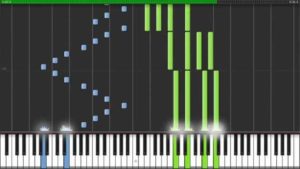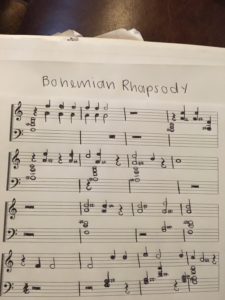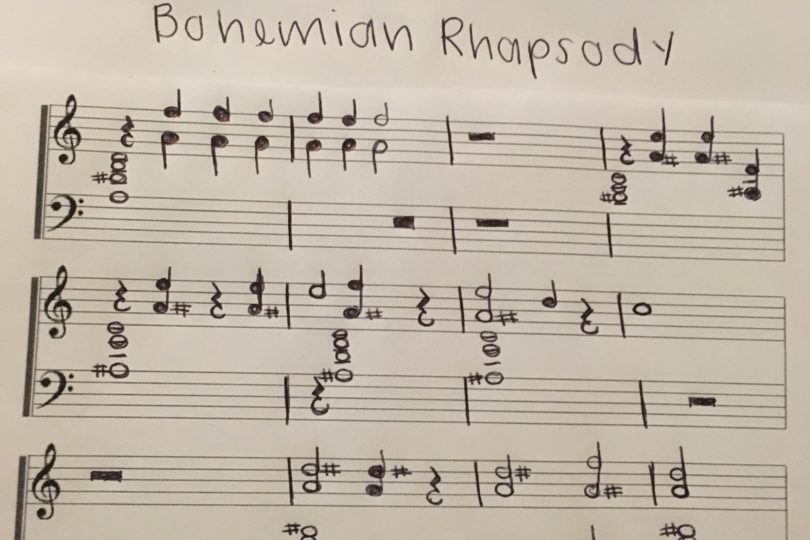I grew up in a very musically inclined family. My grandfather was featured in two Elvis Presley movies playing the piano and continues to play in venues in the Southern California area with his band The Dick Parent Group while my uncle was selected along with 99 other pianists to play for the 1984 summer Olympics opening ceremony. That being said, learning to play the piano was basically not an option for me. I started taking lessons at the age of five, an unusually young age, and have played ever since. At home, we have a Steinway & Sons grand piano which I play when I am at home and at school I play on my small Yamaha keyboard in my room. I use the piano as an outlet for certain emotions. More specifically, during the school year I find that taking a break and playing the piano when I am especially stressed over school work helps me tremendously. It allows my brain to focus on something else without the added factor of stress of a deadline or frustration over not understanding something. I have also thought that the piano has made me a more creative person. I cannot draw or paint, skills that are also prominent in my family, but I feel that the piano has sufficed in fulfilling my need for creativity.
There are studies that show that people who play the piano tend to be more creative than those who do not. The central sulcus is the part of the brain that determines which hand is dominant, meaning that this part of the brain has a greater depth on either the right or the left side. A study involving scanning a number of pianist’s brains showed that pianists have a more symmetrical central sulcus (Sloan). This is because playing the piano requires a person to be able to have complete communication between both hands as notes are being played simultaneously by the right and left hands. Therefore, while someone who plays the piano may be born left or right-handed, their brains will barely register this although the dominance does still exist. This in turn makes the brain more efficient overall. A study by Dr. Ana Pinho showed that when a pianist plays, there is an efficient connection between parts of the frontal lobe. This is significant because the frontal lobe is used in decision making, problem solving, and social behavior among many other important functions of the human brain (Sloan). I cannot say for sure that playing the piano has made me a more creative and intelligent person, but I do know that it has been an effective practice in managing my stress and moving past roadblocks in both my school work and personal life and these studies possibly explain why.
As stated earlier, growing up I had piano lessons every week and my father enforced that my sisters and I practice at least 30 minutes every day. That being said, the number of beginning and advanced practice books along with single compositions of classic Bach pieces we have lying around the house would be impossible to count. As I have grown up and been living at school, my access to piano books has been hindered. This has turned out to be a positive thing for me because now, I play music that I actually want to. Instead of picking up our very worn sheet music of Clair de Lune and listening to it for the millionth time, I have turned to different ways of getting sheet music. My parents are of course very supportive of my interest in music, so they allow any purchase of piano books on their Amazon account, most recently Rolling Stones 500 Greatest Songs of All Time. However, sometimes I just want to learn a single song without having to purchase a book with twenty of the artists most popular songs. This is when I learned about Synthesia. Synthesia is an online application that allows users to practice songs on their computer with a MIDI keyboard. As you can see in the image below, Synthesia is similar to guitar hero in that the notes flow in a continuous fashion and the user then hits the correct note at the correct time.

I find this application very helpful for people who want to begin learning how to play the piano, however I simply use it to obtain sheet music for songs that I want to learn. To do this, I pick a song I want to learn and press play. As the tutorial begins, you can see the notes that are being played. I pause the video and make my own sheet music by copying the notes down. This does take a lot of time and there actually is a feature that allows you to show the snippet of notes in sheet music form that are being played, however this requires paying a fee which I prefer not to do. Identifying notes has become second nature to me so it is not too difficult for me to make sheet music by simply observing the MIDI keyboard. Once I am finished, I have a completed song and am now able to play on my actual piano with the sheet music I have copied. Below is a video of a Synthesia tutorial someone has uploaded to Youtube of Bohemian Rhapsody. Below it is a snippet of the sheet music I made by copying the notes from this video. Disclaimer: I am in no way a professional pianist and sometimes the note lengths are off however after re-watching the video multiple times and looking at my sheet music, I am able to replicate the song perfectly on the piano.

I intend to play the piano for the rest of my life as I have seen the benefits it has had for me on my mood and stress management. Also, I truly enjoy playing the piano. I grew up listening to classic rock so over the years I have taught myself a lot of Led Zeppelin, the Eagles, and Pink Floyd. It is very rewarding and gives me an in-explainable feeling to be able to play the tune of one of my favorite songs and I am definitely thankful to my family for “forcing” this talent upon me.
Works Cited
S, Tyler. “Yousician vs Synthesia – The New Piano Learning App.” VoicesInc, 24 July 2016, www.voicesinc.org/yousician-vs-synthesia/.
Sloan, Jordan Taylor. “Science Shows How Piano Players’ Brains Are Actually Different From Everybody Elses’.” Mic, Mic Network Inc., 26 Oct. 2015, mic.com/articles/91329/science-shows-how-piano-players-brains-are-actually-different-from-everybody-elses#.KGwx5x3GB.
